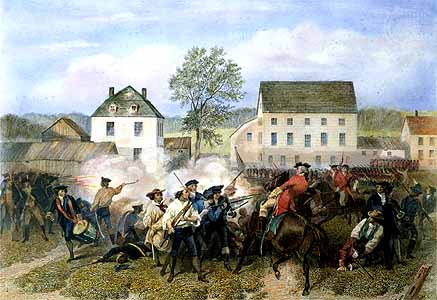April 19, 2007
Gratuitous Historickal Posting (TM) - "Shot Heard 'Round The World" Division

(Image swiped from Britannica)
Today is the anniversary of the Battles of Lexington & Concord in 1775.
It has become something of a hobby-horse of mine here to point out a) that it is impossible to truly understand what a bunch of local militiamen were doing facing off against British Regulars that morning unless one knows something about the preceding forty or so years of relations between Crown and Colonies, and b) so far as I can tell, next to nobody pays any attention to Colonial history nowadays, except to bemoan how unfair it was for the eeeevil Europeans to destroy this earthly Paradise, in which all had been Peace and Harmony until they stumbled across it with their guns, germs and steel.
It is also a tradition for me to plug two of my favorite books on the subject. The first is Montcolm and Wolfe by Francis Parkman, easily one of THE greatest American historians ever. It is one of a series of Parkman's works on the struggle between France and Britain over possession of North America, and I would not hesitate to recommend grabbing any other of his works across which you may stumble.
The second is Crucible of War: The Seven Years' War and the Fate of Empire in British North America, 1754-1766 by Fred Anderson. The last time I mentioned this, one of you (I forget who) noted that you had taken classes with Prof. Anderson, which I thought was pretty coo-el. In thinking about this post, and in honor of both my point and the man, I am today buying another of his books, A People's Army: Massachusetts Soldiers and Society in the Seven Years' War. I'll let you know what I think of it.
Steve-O has spent many years gently mocking me for my Tory sympathies, but I stick to 'em. True, the Crown allowed things to get out of hand through a combination of arrogance and inexperience, but a great deal of what it expected of the Colonies (for example, expecting them to help pay the cost of protecting their own damn' hides) was not at all unreasonable. A more tactful and comprehensive solution (with, say, Colonial representation in Parliament, for example), might well have diffused the situation before it blew up. On the other hand, there were hotheads within the Colonies who hadn't the slightest wish to compromise from Day One. British mismanagement allowed them to take control of the rebellion and fan the flames for a total break.
Of course, if the Brits had managed to hang on to the Colonies, we'd all be Canadians now, so I'm not too upset about the way it all worked out. You've got to look at these things from all angles.
Posted by Robert at April 19, 2007 11:00 AM | TrackBackAnd if the stupid Members of Parliament had actually recognized that the colonies were "growing up" and allowed the colonists to do more of their own manufacturing and shipping, there may not have been so many hot heads. I think it was Franklin who warned them that a 1 or 2 penny tax on a gallon of rum would be sufferable, but then the Tories went ahead and did a 3 penny gallon tax.
Posted by: rbj at April 19, 2007 12:41 PM

 Image courtesy of the lovely and talented
Image courtesy of the lovely and talented 